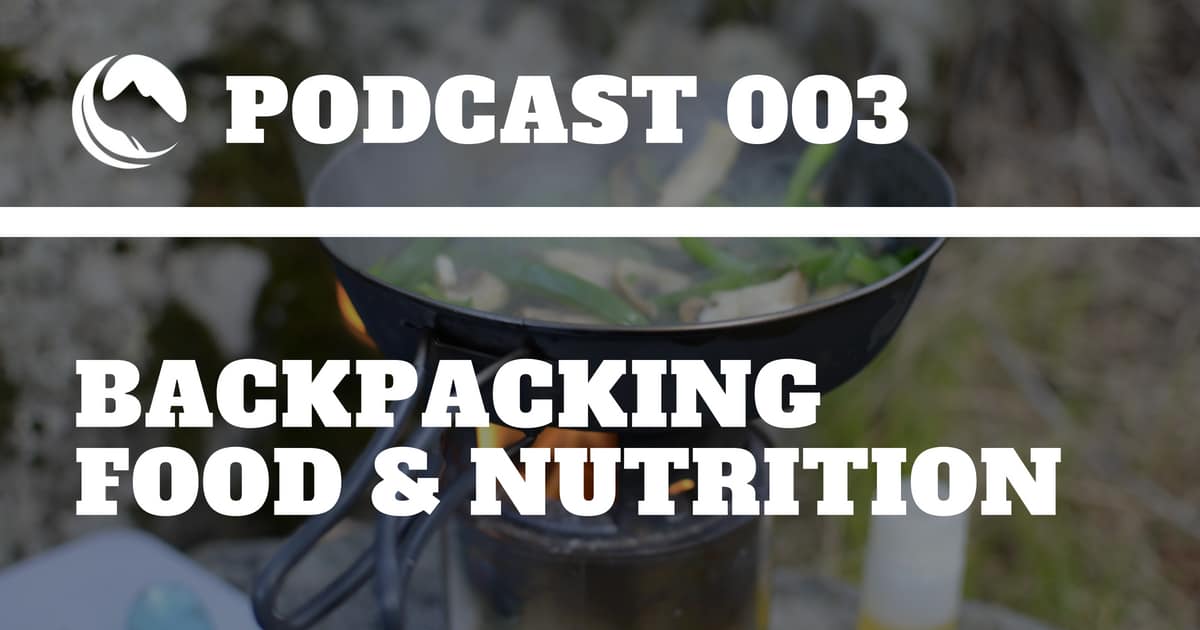Podcast 003 | Backpacking Food and Nutrition
Episode Summary
In this episode we tackle the science, myths, and dogma surrounding backpacking food and nutrition. Featuring guest Brian Rigby, certified sports nutritionist and author. We tackle food and nutrition issues as they relate to thru-hiking, ketogenic diets, plant-based diets (veganism and vegetarianism), gluten-free issues, and macronutrient-micronutrient nutrition. Some questions we ask: what are the caloric and nutritional needs of backpackers? Why do we need to address dogma and pseudo-science in this field? We also take a look at some new cooking and water treatment gear and discuss what's going on in the world of Backpacking Light right now.
Stream
Subscribe
- Apple Podcasts | Google Play | Stitcher | Soundcloud | Youtube | RSS

Summary
In this episode we tackle the science, myths, and dogma surrounding backpacking food and nutrition. Featuring guest Brian Rigby, certified sports nutritionist and author. We tackle food and nutrition issues as they relate to thru-hiking, ketogenic diets, plant-based diets (veganism and vegetarianism), gluten-free issues, and macronutrient-micronutrient nutrition. Some questions we ask: what are the caloric and nutritional needs of backpackers? Why do we need to address dogma and pseudo-science in this field? We also take a look at some new cooking and water treatment gear and discuss what’s going on in the world of Backpacking Light right now.
Outline
- Andrew’s experience with backpacking nutrition during his Appalachian Trail and Colorado Trail thru-hikes
- Ryan’s food journey over the past 30 years
- Guest interview: Brian Rigby, MS, CISSN
- Micronutrients vs. Macronutrients
- What is the function of protein?
- Caloric needs for backpacking
- Resting metabolic rates
- METs
- How does activity level influence caloric burn rates?
- Words of caution about using a metabolic rate calculator
- What about using fitness trackers or apps for estimating caloric expenditures?
- Nutritional Considerations
- Is a calorie a calorie, or is there something about calorie quality that needs to be considered for backpacking vs. caloric density (calories per unit weight).
- How about high caloric density junk foods? Yay or nay?
- How long do we have to spend on a trail before junk food catches up to you and nutrition becomes important?
- How about the lack of B vitamins in processed foods?
- Health vs. performance on a junk food diet
- 3 days vs. 3 months on the trail: macronutrient ratio differences?
- Transition diets: lifestyle vs. on-the-trail
- What about high fat, low carb (e.g., ketogenic) diets for backpackers?
- Advantages, disadvantages, and risks
- Impact on anaerobic power systems
- Ketogenic diets – applicable for ultralight backpacking?
- Be careful when reading thru-hiker “testimonials” about ketogenic diets
- Can we tap into our body fat stores for backpacking energy, and save food weight?
- Bonking
- Can high fat, low carb diets mitigate the effects of “bonking” (i.e., what are the impacts on glycogen?)
- The advantage of a high-carb breakfast before hitting the trail
- Strategies for minimizing bonking for both high-carb and low-carb diets
- Micronutrients
- What’s the best way to maintain micronutrient balance on the trail?
- Does food processing impact micronutrient quality?
- The reality of Vitamin C: how much we really need
- The Emergen-C myth
- Thru-hiker needs for micronutrients and the risks of “pizza-gorging town stops”
- How often do we need to be eating high-quality, micronutrient-rich foods (e.g., fresh fruits and vegetables) on a long-distance hike?
- How about multivitamins?
- Are any type of supplements needed for backpacking?
- How about for vegans/vegetarians?
- How about for women?
- Specific strategies for vegetarian and vegan backpackers
- Protein considerations: legumes, whole grains, and pseudo-grains
- Calcium for vegans?
- How does altitude and/or cold environments impact our food planning?
- Do we need more carbs, or less carbs?
- Clothing or calories? Considerations for staying comfortable in cold temperatures.
- Challenging pseudo-scientific belief systems
- Example: Ketogenic diets
- Micronutrient requirements
- What is the single best thing we can do with our food to improve backpacking performance?
- How do we mitigate injury and illness?
- What’s the risk of under-nutrition / caloric deficit with respect to overuse injuries and/or illness?
- What is the best way to facilitate body repair during a backpacking trip?
- Replenishing glycogen
- Triggering muscle protein synthesis
- Micronutrients vs. Macronutrients
- Listener Q&A
- What is the best way to eat keto/fat-adapted on the trail?
- Andrew’s experiences with keto
- What is the best way to eat vegetarian on the trail?
- Ryan’s experiences with vegetarian/vegan
- Protein, Omega-3 and calcium considerations
- What’s the best way to eat gluten-free on the trail?
- Ryan’s experiences with celiac and gluten-free youth on Scout trips
- Rice and legume pasta discussion
- What are some alternatives to Mountain House?
- Read our new packaged food gear guide!
- Dehydrating, freeze-drying, and sourcing ingredients for your own meals
- How do you source nutritious food for backpacking in chain grocery stores?
- What are the advantages and disadvantages of going stoveless?
- What’s the best way to get good coffee in the backcountry? Best-tasting creamer?
- Challenges for managing diabetes on a multi-day trip?
- What’s the best way to get enough fiber and stay regular on multi-day trips?
- What are some ideas for no-cook lunchtime food other than bars and snacks?
- What’s a good protein source other than jerky that doesn’t require refrigeration?
- What are some foods that last longer in your pack than what the label says?
- What are some foods that keeps well when it’s warm outside?
- Ryan’s 3 recommendations
- What is the best way to eat keto/fat-adapted on the trail?
- Q&A Speed Round
- Best way to improve flavor of any dish?
- Favorite backcountry recipe?
- Favorite on the go snack?
- Favorite trail mix recipe?
- Gear
- MSR Trail Base Water Filter System
- Alcohol Stoves: Trail Designs & Zelph
- Here and Now
- Switchback Showcase Wrap-Up
- Gila Wilderness
- Summer Podcast Series Updates
- Guide’s Roundtable (June)
Links
- Calculating metabolic rates using the Harris-Benedict Equation
- Brian Rigby
- Brian’s book: The Multivitamin Lie
- Brian’s podcast: ClimbSci
- Brian’s website: Climbing Nutrition
- Brian’s professional practice: Elite Sports Nutrition in Boulder, CO (720) 583-5558
- Ryan’s favorite sardines and plant-based protein powder
- Ryan’s favorite GF, high-protein pasta
- Dehydrated and Freeze-Dried Backpacking Dinners (Gear Guide)
- Some favorite packaged Meal Sources:
- Harvest Right Home Freeze Drying Machines
- Coffee creamer option: Nido
- The Beautiful Cup: Backcountry Coffee for the Ultralight Backpacker, by Mike Clelland!
- Really good instant coffee
- The lightest and best hand-espresso machines on the market – high pressure, terrific crema, quality shot!
- MSR Trail Base Water Filtration System
- Zelph & Trail Designs Alcohol Stove Review
- High Sierra Trail Film Trailer
Feedback, Questions, Tips?
- Submit them via email or Twitter and get featured on our next podcast!
- Next podcast topic: Guide’s Roundtable – a roundtable discussion about ultralight backpacking, life, and public lands protection with our trekking guides, to be recorded live in the field during our Guide’s Training Trek in June 2018.
Credits
- Backpacking Light – Executive Producer
- Ryan Jordan – Director and Host
- Andrew Marshall – Producer and Host
- Brian Rigby – Guest Interview
- Look for Me in the Mountains – Music
- Written by: Chris Cunningham and Ryan Jordan
- Performed by: Chris Cunningham (acoustic guitar, lead and harmony vocals, harmonica), Chad Langford (upright bass), and Tom Murphy (mandolin).
- Produced by: Basecamp Studios in Bozeman, Montana
Sponsors: Help us Keep the Podcast ADVERTISING-FREE!
- This episode of the Backpacking Light Podcast is supported and kept advertising-free by Backpacking Light membership fees. Please consider becoming a member which helps support projects like this podcast, in addition to a whole slew of other benefits!
- In addition, some of the links on this page may be affiliate links that refer to our partner merchant retailers. If you follow a link and then make a purchase, we receive a small commission which goes a long way towards helping us pay for podcast production, hosting, and bandwidth fees! Thanks for supporting us in this way!
Contact
You can contact us at [email protected], or follow us on social media –
- Backpacking Light – Facebook | Instagram | Twitter
- Andrew Marshall – Instagram | Twitter | WWW
- Ryan Jordan – Instagram | Twitter | WWW




Home › Forums › Podcast 003 | Backpacking Food and Nutrition